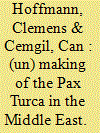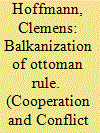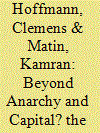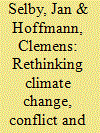|
|
|
Sort Order |
|
|
|
Items / Page
|
|
|
|
|
|
|
| Srl | Item |
| 1 |
ID:
153878


|
|
|
|
|
| Summary/Abstract |
Turkey’s foreign policy activism has received mixed reviews. Some feel threatened by the alleged increasing Islamization of the country’s foreign policy, sometimes called ‘neo-Ottomanism’, which is seen as a significant revision of Turkey’s traditional transatlanticism. Others see Turkey as a stable democratic role model in a troubled region. This debate on Turkish foreign policy (TFP) remains dominated by a sense of confusion about what appear to be stark contradictions that are difficult to make sense of. Intervening in this debate, this article will develop an alternative perspective to existing accounts of Turkey’s new foreign policy. Offering a historical sociological approach to foreign policy analysis, it locates recent transformations in Turkey’s broader strategies of social reproduction. It subsequently argues that, contrary to claims about Turkey’s ‘axis shift‘, its changing foreign policies have in fact never been pro-Western or pro-American. All foreign policy ‘shifts’ and ‘inconsistencies’, we argue, are explicable in terms of historically changing strategies of social reproduction of the Ottoman and Turkish states responding to changing domestic and international conditions.
|
|
|
|
|
|
|
|
|
|
|
|
|
|
|
|
| 2 |
ID:
085394


|
|
|
|
|
| Publication |
2008.
|
| Summary/Abstract |
The term `Balkanization' has found entry in the social sciences vocabulary as a metaphor for diversity at best, social and political instability for the most part, and genocidal war at worst. And yet it is precisely the emergence of a variety of national states and the Ottoman Empire's disintegration that are frequently portrayed as processes of `modernizing' as well as `naturalizing' the international system of the Balkans and the Middle East. By offering a historical sociological re-construction of early modern Ottoman history up to the Greek Revolt in 1821, I argue in this article that the national secessions were not synonymous with the creation of a `modern' international system in southeastern Europe
|
|
|
|
|
|
|
|
|
|
|
|
|
|
|
|
| 3 |
ID:
183468


|
|
|
|
|
| Summary/Abstract |
The drylands of the Middle East have been long seen not only as unfavourable to life, but also and relatedly, socio-politically fragile. Fraught with myths of eternal ‘ethnic’, ‘sectarian’, or ‘resource conflict’, the chronic political instability of the Middle East from Afghanistan and Yemen to Iraq and Syria has been often seen as intrinsic to a scarce ‘nature’, a scorched earth, tendentially collapsing into brute violence which in its spectacular extreme has been exercised by the so-called ‘Islamic State’ (IS)
|
|
|
|
|
|
|
|
|
|
|
|
|
|
|
|
| 4 |
ID:
136215


|
|
|
|
|
| Summary/Abstract |
This special issue of Geopolitics presents a series of critical interventions on the links between global anthropogenic climate change, conflict and security. In this introduction, we situate the special issue by providing an assessment of the state of debate on climate security, and then by summarising the eight articles that follow. We observe, to start with, that contemporary climate security discourse is dominated by a problematic ensemble of policy-led framings and assumptions. And we submit that the contributions to this issue help rethink this dominant discourse in two distinct ways, offering both a series of powerful critiques, plus new interpretations of climate-conflict linkages which extend beyond Malthusian orthodoxy.
|
|
|
|
|
|
|
|
|
|
|
|
|
|
|
|
|
|
|
|
|